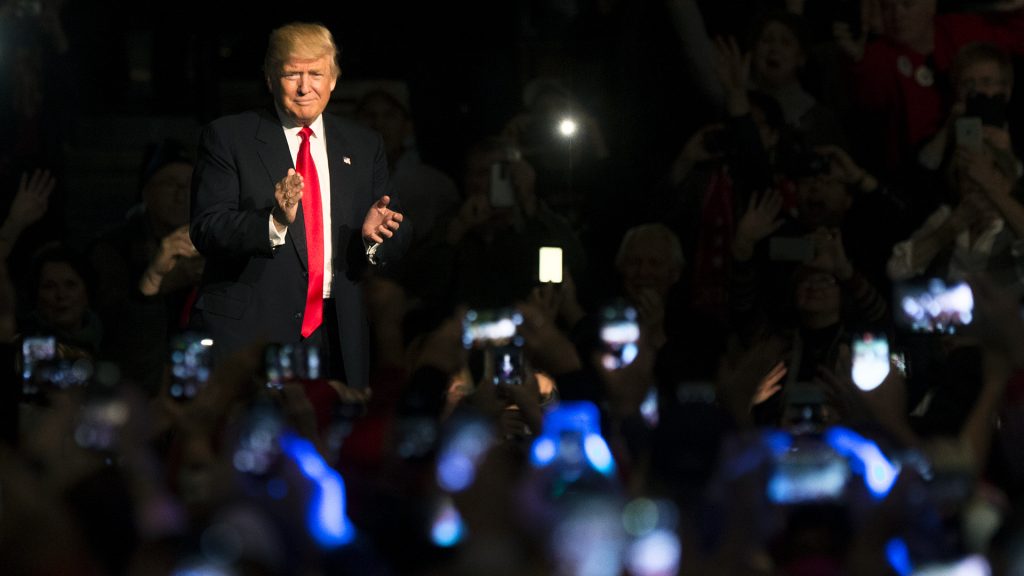From the early days of his campaign, President Donald Trump has hungered for a trade war. Last week, he took his first steps toward that end with his surprise announcement of tariffs on steel and aluminum imports. The move is controversial — congressional Democrats and Republicans are critical, and Trump’s chief economic adviser has resigned over the decision. The controversy stems from one fatal flaw in the design of Trump’s tariff policy: It is a massive, idiotic mistake.
Trump’s understanding of trade isn’t elementary — it’s downright ignorant. Like everything else, Trump sees trade as a test of global strength and masculinity. Whoever sells more must be winning, and whoever buys more must be losing. Surplus good, deficit bad. Trade is, of course, far more complex. It isn’t a zero-sum game — trade without coercion is mutually beneficial. For example, we buy a lot of aluminum from Canada to use manufacturing cars, houses, and the like. Why? Because Canada has an abundance of hydroelectric power, and the creation of aluminum is electric-intensive. From the deal, we get cheaper aluminum, they sell more aluminum, and manufacturers on both sides of the border benefit.
Tariffs are blunt instruments, ham-fists that more often than not hurt the country imposing them. Indeed, experts say for every new job at a steel mill or aluminum smelter that is generated by Trump’s tariff, the U.S. will lose as many or more jobs in sectors that rely on those metals, which will now cost more. History has proven this to be true, as when after Bush implemented a steel tariff in 2002, nearly 200,000 jobs were lost the following year as a result.
RELATED: Elliot: Would trade war affect golf courses?
We simply don’t create enough steel and aluminum to get by on our own, and even if we did, other nations can do it cheaper. When our imports are cheaper, we can produce more. The proposed tariffs are poised to do serious harm to U.S. companies that rely on aluminum and steel, and things could get much worse very quickly.
Trade wars are tit-for-tat. If we start putting tariffs on steel and aluminum, our trading partners will slap tariffs on major U.S. exports. This has the potential to devastate the U.S. economy, which relies heavily on manufactured exports.
Ostensibly, the Trump tariffs are meant to target China, which has produced far more steel than the world can use, driving down steel prices. This type of cheating is a legitimate problem, but imposing unfocused tariffs on steel and aluminum will leave China practically untouched. Our major suppliers of steel and aluminum are allies such as Canada and South Korea. Instead of building a coalition to fight China’s manipulation of steel prices, Trump has antagonized every U.S. ally while doing almost nothing to disrupt China’s trade policies.
Global trade has vast benefits. The U.S. Chamber of Commerce estimates U.S. families have an extra $18,000 in spending power because of lower prices and more choices brought by global trade. The costs of global trade, on the other hand, are acutely felt.
Manufacturing cities in the Midwest have suffered from global competition. It’s worth noting that not all manufacturing jobs are lost due to global trade. MIT economist Daron Acemoglu estimates that about 1 million of the 5.5 million manufacturing jobs lost between 1999 and 2011 were because of Chinese competition. Technology remains the dominant cause of manufacturing job loss in the U.S.. Compare these losses to the benefits of a trade deal such as NAFTA, which supports 14 million American jobs and generates $1.3 trillion annually in goods and services traded across our borders, and you see that trade is not sucking our nation dry. The opposite is true, as the United States is one of the primary beneficiaries of globalization. Domestic policies have failed to assist former manufacturing employees in transitioning to other careers, and the benefits of global trade, like so much else in the U.S., have been concentrated with the very wealthiest Americans.
The Trump tariffs will undoubtedly hurt the U.S. economy and global standing while providing little to no benefit. Trump’s willful ignorance of basic economic theory is putting millions of U.S. jobs at risk. Every nation we trade with is considering imposing tariffs on the U.S. in retaliation, and when united against the us, the world has far more say over our economy than we do over theirs.



